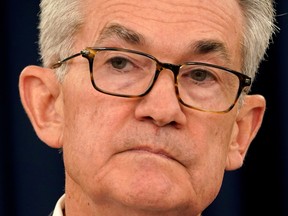Powell Reiterates Case for Interest Rate Cuts Amid Increased Economic Risks

Federal Reserve Chairman Jerome Powell Says Downside Risks to the U.S. Economy Have Increased Recently
Federal Reserve Chairman Jerome Powell has reiterated the case for interest rate cuts amid increased economic risks, echoing his comments from last week following the Federal Open Market Committee meeting. In a speech at the Council on Foreign Relations in New York, Powell highlighted the importance of the central bank’s autonomy from political interference.
Crosscurrents and Economic Uncertainty
Powell stated that "crosscurrents have reemerged" with apparent progress on trade turning to greater uncertainty. This shift has led to renewed concerns about the strength of the global economy. He noted that the economic outlook remains promising, with unemployment near historic lows. However, he added that the risks to this favorable baseline outlook appear to have grown.
Economic Data Suggests Investment by Businesses Has Slowed
Powell also mentioned that the limited available evidence suggests that investment by businesses has slowed from the pace earlier in the year. He pointed out that sales of new U.S. homes fell to a five-month low in May, while consumer confidence dropped in June to its lowest level since September 2017.
Fed’s Powell on Independence and Autonomy
Powell emphasized the importance of the central bank’s autonomy from political interference. He stated that "the Fed is insulated from short-term political pressures" and that Congress chose to insulate the Fed this way because it had seen the damage that often arises when policy bends to short-term political interests.
Trump’s Criticism of the Federal Reserve
President Donald Trump has been critical of the central bank for keeping credit too costly and for failing to lower interest rates last week. He compared the Fed to a "stubborn child" and said they "blew it" on June 19 when they kept the benchmark overnight rate unchanged at just under 2.5 per cent.
Policy Makers Advocate for Rate Cut
Some Federal Open Market Committee members, including St. Louis Fed chief James Bullard and the Minneapolis Fed’s Neel Kashkari, advocated for a rate cut last week. They were driven by concern that inflation is stuck below the central bank’s 2 per cent target.
Economic Outlook Remains Promising Despite Risks
Powell stated that the economic outlook remains promising, with unemployment near historic lows. However, he added that the risks to this favorable baseline outlook appear to have grown. He noted that there are concerns about the strength of the global economy and the impact of trade disputes on the U.S. economy.
Stocks Bounce Back After Powell’s Comments
Stocks bounced back after Powell’s comments, with investors taking a more positive view of the economic outlook despite the increased risks.
Economic Data
- Sales of new U.S. homes fell to a five-month low in May.
- Consumer confidence dropped in June to its lowest level since September 2017.
- The limited available evidence suggests that investment by businesses has slowed from the pace earlier in the year.
Conclusion
In conclusion, Federal Reserve Chairman Jerome Powell has reiterated the case for interest rate cuts amid increased economic risks. He emphasized the importance of the central bank’s autonomy from political interference and noted that the economic outlook remains promising despite the risks. The Fed’s decision on interest rates will be closely watched by investors and policymakers alike.
References
- Bloomberg.com
- Federal Reserve website
Join the Conversation
What are your thoughts on the Fed’s decision to cut interest rates? Share your opinions in the comments section below.
Related Articles
- Los Angeles Faces Little Relief From Wildfires as Winds Persist
- History is Foreshadowing the Worst of Times for Markets
- A Cut in January, Then a Pause: What Jobs Data Mean for Bank of Canada and Interest Rates
- Economy
- Howard Levitt: Trudeau’s Exit a Reminder of the Perils of Wrongful Resignation
- Work
- How Far Could Trump Go Using ‘Economic Force’ to Try and Annex Canada?
- News